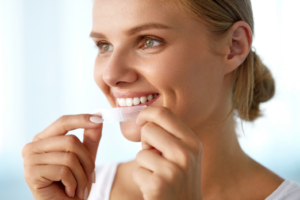Natural Ways to Whiten Your Teeth at Home; Tips from a Teeth Whitening Dental Practice in Jefferson Park

Teeth can become yellow over time, but there are several strategies that you can use to slow down or even reverse the process naturally. In general, teeth become yellow for two reasons: enamel thinning and stains. Enamel is the outer layer of the teeth, and it is colored almost white. Beneath it is a tissue known as dentin, which is yellow-brown in color. When the outer layer of enamel thins, dentin becomes more visible, and the teeth take on a darker color. Enamel can become thinner for a variety of reasons, including aging, acidic foods, and gum disease. Stains will also change the coloring of the teeth, and certain foods, beverages, and products (such as cigarettes and some antibiotics) can cause stains. So, how can you whiten your teeth naturally at home?
Make Dietary Changes
The first step to whitening your teeth naturally is to make some dietary changes. This can be difficult, but without this step, your teeth will tend to become yellow faster than average. Drinks such as red wine, tea, coffee, and dark sodas are always an issue, along with acidic foods that can wear down the enamel. There is also tobacco, which does considerable staining. However, if you do not want to change your diet, an alternative would be to brush your teeth 30 minutes after consuming one of these products. Make sure that you do not brush immediately after a meal, because that can also damage the enamel of the teeth.
Oil Pulling
Oil pulling is a teeth cleaning technique that is used to remove debris, dirt, and bacteria. This technique is used alongside brushing and flossing, with some research suggesting that it can help whiten teeth. However, opinions vary, with the American Dental Association (ADA) stating that oil pulling is not very effective. To try this technique, you can use sunflower, sesame, or coconut oil to rinse your mouth for one minute after brushing.
Baking Soda
When it comes to baking soda, research is much more conclusive. Contrary to some opinions out there, baking soda is not harsh enough to harm enamel, but it is effective at removing stains and fighting bacteria.
Hydrogen Peroxide
Hydrogen peroxide is a mild form of bleach that is effective at whitening teeth. It can be used with baking soda once or twice a week for optimal results. However, it can also increase tooth sensitivity, so it is not recommended for long term use.
Fruits
There have been preliminary studies showing that enzymes such as bromelain and papain—which are found in pineapples and papayas respectively—may have a whitening effect on teeth. This is particularly good news if you enjoy those two fruits.
Methods to Avoid
There are a few methods that either do not work, or that may actively harm your teeth. These methods involve using lemons, oranges, apple cider vinegar, or activated charcoal as cleaning agents. We do not recommend any of them as teeth whitening substances.
Conclusions from a Teeth Whitening Dentist in Jefferson Park
With a few changes to your diet, more regular brushing, and weekly brushes with baking soda and hydrogen peroxide, you should start to see teeth whitening results. Other options may or may not be as effective. It’s important to keep in mind that whitening your teeth naturally requires long-term commitment.
Over the counter whitening products are usually much more effective, and they are usually safer to use. They can include toothpastes, mouthwashes, and whitening strips, among others.
Ultimately, the best and most effective method involves professional teeth whitening by a Jefferson Park dental practice. If you’d like to find out more about this process, do not hesitate to contact us today!

